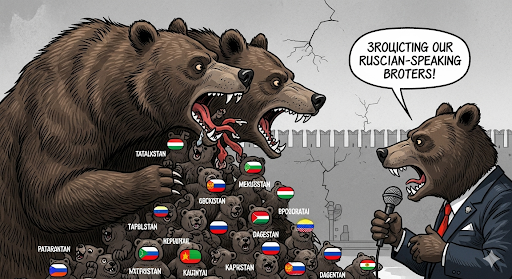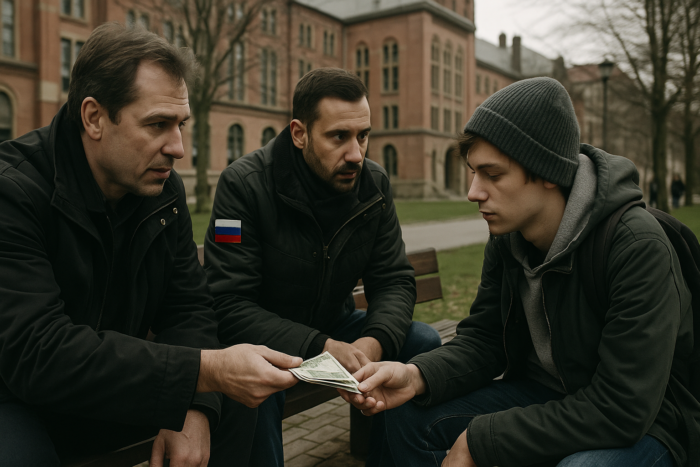Estonia and Latvia are implementing measures to counter Russian influence operations targeting their Russian-speaking minorities, including phasing out Russian language education and targeting Russian-linked organizations as Moscow weaponizes propaganda through social media and cultural spheres. On 19 October 2025, Kyiv Independent reported that Russia persistently seeks to influence Estonia’s Russian-speaking community by weaponizing virtually every sphere of human activity, including language, culture, and sports, to sway public opinion and sow division. The article begins:
As Moscow steps up its hybrid onslaught against the Baltic states, local Russian-speaking populations present a potential weak spot to exploit. Russian is the mother tongue of roughly one-quarter and one-third of the populations of Estonia and Latvia, respectively, two small nations at NATO’s eastern frontier. Adopting a “wartime” mentality — fueled by the war in Ukraine and Russian aerial incursions — Tallinn and Riga increasingly see this minority as a potential risk, says Vendula Kazlauskas, an expert on the Baltic region at the Prague-based Association for International Affairs. Seeking to curb Moscow’s influence, Latvia and Estonia are phasing out the Russian language in education, tightening immigration rules, and targeting Russian-linked organizations.
Key Points
- Russia persistently seeks to influence Estonia’s Russian-speaking community by weaponizing virtually every sphere of human activity including language, culture, and sports, with propaganda efforts intensifying after Moscow’s full-scale invasion of Ukraine in 2022.
- Security expert Marek Kohv says Russia uses social media and online portals to promote narratives about the decline of the West and alleged oppression of Russian speakers as part of broader hybrid operations.
- Latvia amended immigration laws requiring Russian nationals to pass basic language tests and undergo security checks, while Estonia barred non-EU citizens from voting in local elections, primarily affecting Russian citizens without local passports.
- Estonia’s Deputy Secretary General for Internal Security stated that countering Russia’s long-term propaganda and disinformation threat targeting the population is a question of self-preservation for the small nation.
Russian Influence Operations in the Baltic States: Social Media Manipulation, Disinformation Campaigns, and Strategic Threats
Russian influence operations in the Baltic states employ a sophisticated blend of social media manipulation, soft power strategies, and disinformation campaigns designed to exploit ethnic divisions and undermine democratic institutions. Moscow uses platforms like Telegram, TikTok, Facebook, and X to spread claims of discrimination against Russian-speaking minorities in Estonia, Latvia, and Lithuania.
These narratives portray Baltic government language policies as oppression while branding restrictions on Russian state media as violations of free speech, with some propaganda comparing such measures to Nazi actions. Facebook accounts disguised as local community groups such as “Tallinners” or “Russian-speaking Estonia” push content suggesting that aid to Ukraine is foolish and that life was preferable under Russian influence.
The strategic depth of these operations extends beyond digital platforms. A 136-page analytical report released by Russia in 2024 detailed strategies to enhance soft power through education, culture, and social networks to bypass propaganda restrictions. According to secret Kremlin documents obtained by an international journalism consortium, Moscow’s plans include funding pro-Russian NGOs, preserving Russian-language education, opposing the demolition of Soviet monuments, and creating conditions that would force Baltic authorities to recognize NATO expansion as damaging to national security.
The documents, prepared by the Directorate for Cross-Border Cooperation directly under Vladimir Putin’s administration in autumn 2021, reveal long-term objectives to restore “constructive relations” with Lithuania while maintaining information influence over Russian-speaking minorities in Estonia and Latvia through both conventional and online media.
Beyond information warfare, Russia has employed cyber-enabled operations with measurable impact on regional stability. A state-sponsored cyber espionage group designated UNC1151 conducts the “Ghostwriter” campaign, which promotes narratives critical of NATO’s presence in Eastern Europe while compromising social media accounts of Polish officials to publish politically disruptive content.
Quantitative research published in Public Integrity found that Russian disinformation increases perceived distrust of governments and heightens the sense of military threat, with observable decreases in citizens’ incentives for investment activities. Lithuania’s security services report that recent campaigns spread false information about explosives in schools, timed to coincide with the academic year and a teachers’ strike, with approximately 900 Russian-language false warnings received by local police.
The Baltic states have responded with comprehensive protective measures. Estonia transitioned to Estonian-only school instruction by 2030, while Latvia mandated that public media broadcast exclusively in Latvian or European languages by 2026. Estonia also enacted legislation requiring the Russian Orthodox Church to sever ties with the Moscow Patriarchate, reflecting concerns about the Church’s role as a vehicle for Kremlin-aligned narratives.
Former Latvian President Egils Levits emphasized that national cohesion and clear identity serve as the primary defense against Russian interference, warning of Moscow’s “undefeated imperialistic spirit.” Research from the George C. Marshall European Center for Security Studies notes that Russia views the Baltic states not as territories to reconquer but as leverage points against NATO, the EU, and the United States—part of Moscow’s broader “political war” with the West that combines military deployments, A2AD capabilities, exercises, information operations, and political subversion through front organizations and parties.
External References:
— The Baltic States as Targets and Levers: The Role of the Region in Russian Strategy
— Russian influence operations against Baltic states and Poland having ‘significant impact’ on society
— Secret Kremlin document reveals Russia’s plans for Baltic states
Disclaimer:
The Global Influence Operations Report (GIOR) utilizes AI throughout the posting process, including the generation of summaries for news items, introductions, key points, and, often, the “context” section. We recommend verifying all information before use. Additionally, all images are generated using AI and are intended solely for illustrative purposes. While they represent the events or individuals discussed, they should not be interpreted as real-world photography.











